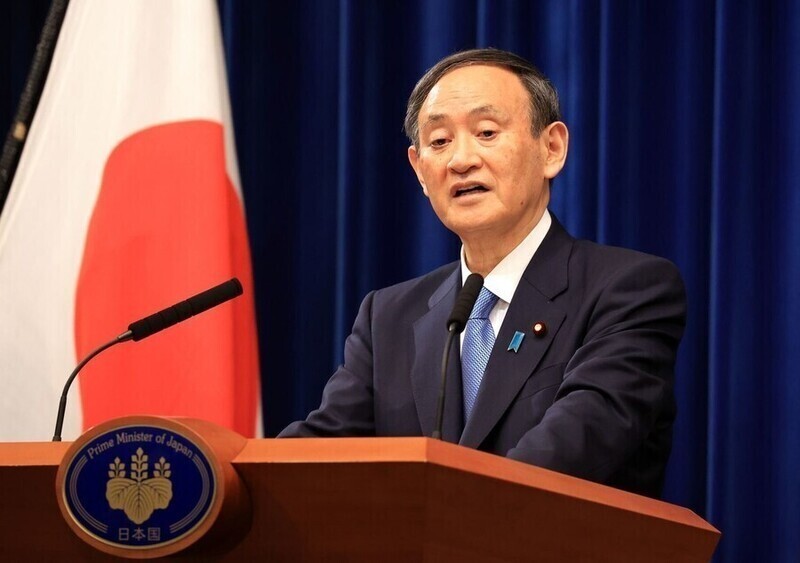hankyoreh
Links to other country sites 다른 나라 사이트 링크
[Editorial] Japan’s new diplomatic bluebook repeats inaccurate claims on “comfort women,” Dokdo

The 2021 Diplomatic Bluebook unveiled by the Japanese government Tuesday repeated the same unconvincing claims about Dokdo being “inherently Japanese territory.” It also referred to a Seoul Central District Court decision in January awarding compensation to survivors of Japanese military sexual slavery as being “utterly unacceptable.”
The Diplomatic Bluebook is an official document in which Japan announces its diplomatic guidelines domestically and internationally each year. It’s unfortunate to see the Japanese government parroting the same old arguments in the latest version, which is the first to come out since a new Cabinet was launched under Prime Minister Yoshihide Suga.
It’s enough to erase any shred of hope that Suga’s arrival in office last September might be a step on the way to relieving the severe strain that South Korea-Japan relations suffered during his predecessor Shinzo Abe’s tenure.
The Diplomatic Bluebook stated that Dokdo was “clearly inherently Japanese territory, both according to historical fact and in terms of international law.” It also claimed that South Korea “continues its illegal occupation [of the islets] without any basis in international law, including the permanent stationing of guard units.”
As recently as its 2017 Diplomatic Bluebook, Japan had been simply referring to Dokdo as “Japanese territory.” But after relations with Seoul severely soured in 2018, that year’s edition saw the addition of a reference to “illegal occupation,” which Suga has carried on intact.
The latest Diplomatic Bluebook also included new references to the Seoul Central District Court ruling awarding compensation to military sexual slavery survivors, which it said was “in violation of international law and agreements between South Korea and Japan.”
It further announced plans to “continue sternly demanding that South Korea develop appropriate measures to remedy the violation of international law.” On the issue of forced labor mobilization, it repeated its previous insistence that South Korea needs to quickly devise a solution that is acceptable to Japan.
It’s deeply disappointing to see the Japanese government attempting to blame South Korea and hold it responsible for a tragedy that arose because of Japan’s own colonization history and wars of aggression.
Tokyo needs to face up to the fact that the Japanese military sexual slavery issue ultimately boils down to a matter of human rights violations and infringements of universal rights perpetrated against women during an unprecedented global military conflict.
There are a lot of issues that need to be resolved between South Korea and Japan. In addition to the historically rooted ones, there is also the matter of Japan’s decision to release radioactively contaminated water from Fukushima into the sea, as well as the North Korean nuclear issue and other matters related to the Korean Peninsula’s political situation.
In his commemorative address for this year’s March 1 Independence Movement Day, South Korean President Moon Jae-in indicated a strong commitment to improving ties with Japan. Yet, Tokyo continues doggedly sticking to its guns. Japan needs to let go of its galling perceptions on historical matters and its irresponsible attitude on the Fukushima water issue and make good faith efforts to resolve these things through dialogue with South Korea.
Hopefully, they will realize the obvious truth that it takes two to achieve a real solution.
Please direct comments or questions to [english@hani.co.kr]

Editorial・opinion
![[Correspondent’s column] The real reason the US is worried about Chinese ‘overcapacity’ [Correspondent’s column] The real reason the US is worried about Chinese ‘overcapacity’](https://flexible.img.hani.co.kr/flexible/normal/500/300/imgdb/original/2024/0510/5217153290112576.jpg) [Correspondent’s column] The real reason the US is worried about Chinese ‘overcapacity’
[Correspondent’s column] The real reason the US is worried about Chinese ‘overcapacity’![[Editorial] Yoon’s gesture at communication only highlights his reluctance to change [Editorial] Yoon’s gesture at communication only highlights his reluctance to change](https://flexible.img.hani.co.kr/flexible/normal/500/300/imgdb/original/2024/0510/7717153284590168.jpg) [Editorial] Yoon’s gesture at communication only highlights his reluctance to change
[Editorial] Yoon’s gesture at communication only highlights his reluctance to change- [Editorial] Perilous stakes of Trump’s rhetoric around US troop pullout from Korea
- [Guest essay] Preventing Korean Peninsula from becoming front line of new cold war
- [Column] The state is back — but is it in business?
- [Column] Life on our Trisolaris
- [Editorial] Penalties for airing allegations against Korea’s first lady endanger free press
- [Editorial] Yoon must halt procurement of SM-3 interceptor missiles
- [Guest essay] Maybe Korea’s rapid population decline is an opportunity, not a crisis
- [Column] Can Yoon steer diplomacy with Russia, China back on track?
Most viewed articles
- 1[Correspondent’s column] The real reason the US is worried about Chinese ‘overcapacity’
- 2[Book review] Who said Asians can’t make some good trouble?
- 3Korean firms cut costs, work overtime amid global economic uncertainties
- 4Presidential office warns of veto in response to opposition passing special counsel probe act
- 5[Editorial] Perilous stakes of Trump’s rhetoric around US troop pullout from Korea
- 6Nuclear South Korea? The hidden implication of hints at US troop withdrawal
- 7In Yoon’s Korea, a government ‘of, by and for prosecutors,’ says civic group
- 8With Naver’s inside director at Line gone, buyout negotiations appear to be well underway
- 9[Editorial] Yoon’s gesture at communication only highlights his reluctance to change
- 10Yoon rejects calls for special counsel probes into Marine’s death, first lady in long-awaited presse